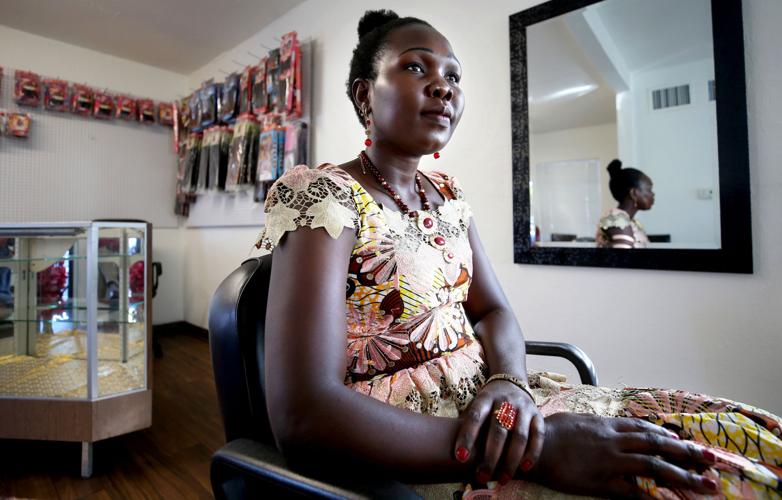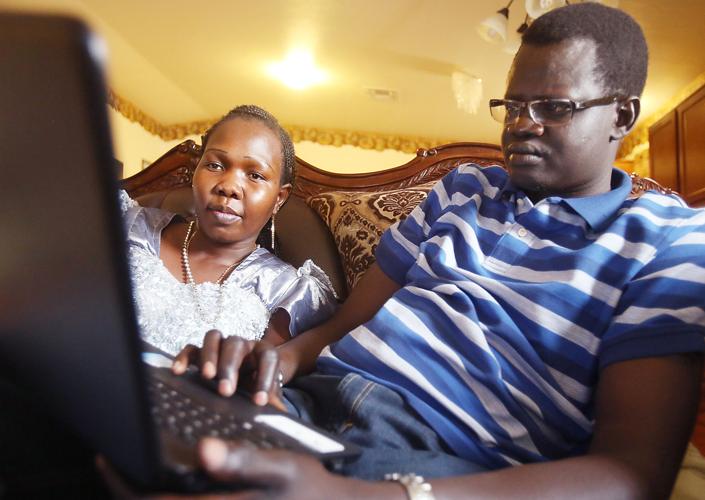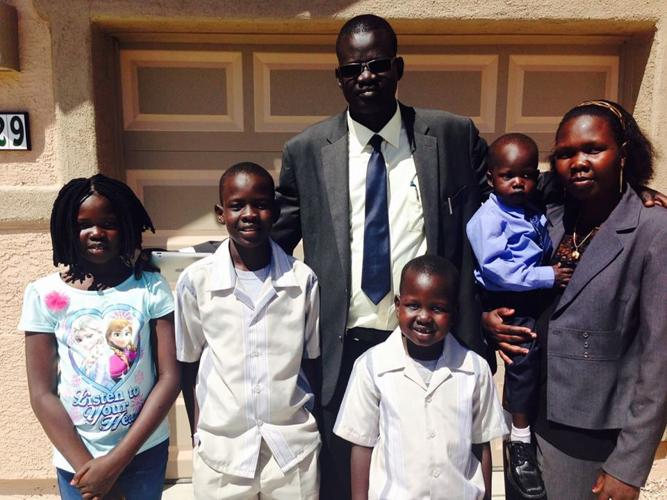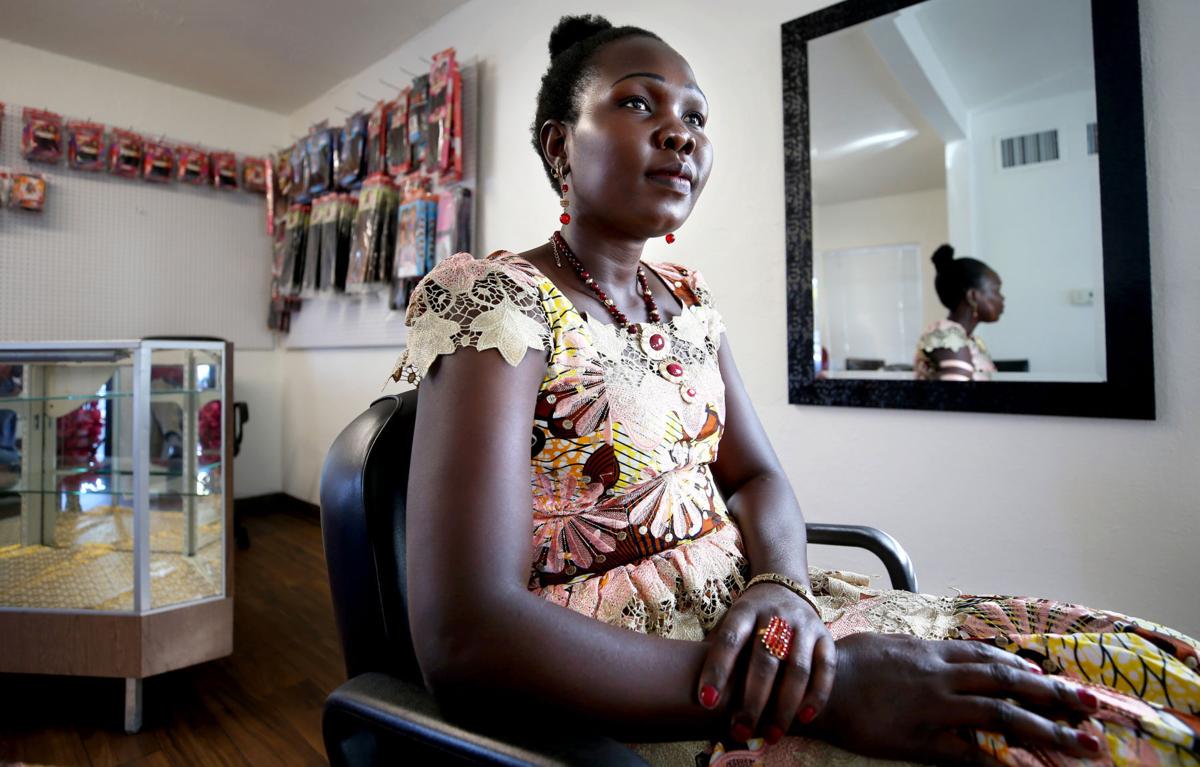Daruka Ajang's new African braiding salon holds her family's hopes for the future.
She imagines chairs full of customers, the glass display case stocked with purses and jewelry from around the world, an empty property nearby transformed into a restaurant.
But she'll take it one step at a time, just as she and her husband John Anyieth have done since moving to the United States five years ago.
The family spent about 20 years in refugee camps in Kenya waiting for this chance at a new life — they don't plan to waste it.
Nile Star Braiding Salon, 2914 E. 22nd St., opened in October. Ajang and four other women do single braids, twists, sew-ins and crochet. She is also offering henna.
"Our hope is to have a better life, and that's what we are trying..." says Ajang, 34. "Both of us are working, and what we're doing is still not enough ... That's why we are trying hard to make a business so things change, and if the business works, we will have a better life."
Ajang, who has been braiding for a long time, joins other Tucson refugee women in using existing skills for entrepreneurial endeavors. Last year, Syrian women rallied around baking with a series of sweets sales for the community. Other women have sold needlework, sewing and crocheting handmade crafts at local markets. (One group is selling hand-sewn items at the Made in Tucson Market Nov. 18).
"That's part of the refugee experience, to find as many different ways to bring income into the household as possible," says Jeffrey Cornish, the executive director of the International Rescue Committee in Tucson.
Anyieth, 36, works at Costco, and Ajang works as a certified nursing assistant. To save up for rent and the hair extensions available in the shop, Ajang says she worked two jobs, 12 hours a day, six days a week. She's still working one of those jobs but has made room for the business.
The couple also has four children, ages 15, 12, 8 and 4. Three of the four children were born in Kenya. Their youngest son joined the family in the U.S.
"Daruka is determined, she is persistent and she is really hardworking," says friend Beth Miksa.

John Anyieth and Daruka Ajang came to the United States five years ago with three of their children. Their youngest son was born here.
Building a life in limbo
Although both Ajang and Anyieth spent most of their lives in Kenyan refugee camps, both were born in what is now South Sudan and fled violence as children.
"When the shooting started, we had to run..." Ajang recalled. She and her mother and two sisters were separated from her father after he was shot in the arm. The family reunited in Ethiopia in 1989 and then fled violence again, back to Sudan. Continued fighting propelled them out of the country to a refugee camp in Kenya in 1992.
Anyieth fled with his own family around the same time, driven out by the decades-long conflict sparked by the Sudanese government's refusal to acknowledge previously agreed-upon autonomy for southern Sudan. South Sudan became independent in 2011, although civil war and ethnic clashes have continued. Arizona has resettled 39 refugees from South Sudan but more than 2,500 from Sudan, according to figures from the Arizona Refugee Resettlement Program. When the family began the resettlement process in Kenya, the country was not yet divided, Anyieth says.
Ajang grew up in a Kenyan refugee camp, married Anyieth, and they began a family of their own. Not long after the wedding, the couple moved to a second camp in hopes of improving their chance at resettlement.
Anyieth said camps lacked food, security and medical facilities. He said the family also faced opposition in the second camp, where most of the other refugees had fled from Somalia, a predominantly Muslim country. Ajang tried to blend in by covering her head in public despite the family's Christian faith. She forgot one day and people threw stones at her on the way home from the market.
"I was seven months pregnant," she says.
Despite the conditions, the camp is where the couple got their entrepreneurial start. Three years before leaving for the U.S., they opened a restaurant serving regional food, Ajang says. Around 30 customers dined with them daily.
They opened the business to stockpile a taxi fund in case one of their children needed emergency healthcare in the middle of the night. Without cash for a cab, they were looking at a three-hour walk to the hospital, she says.
About 10 years after applying for resettlement, they finally got the news: They were America-bound.
"The first thing we wanted was to get out of the camp and go anywhere, whether the U.S. or Canada or Australia," Anyieth says. "But we were excited about America, the land of opportunity."
A new set of challenges
The last five years have brought jobs, a car, a child, a house and now a business.
"Adapting to a new country is a process," Anyieth says. "We are learning a lot. We are not 100 percent, and we don't understand all of it, but we're getting there."
They made their first priority paperwork and green cards. Now they're in the process of applying for U.S. citizenship and have interviews in December.
"When we came here, we expected this to be our home, so when we came, we were excited about it," Anyieth says. "There's nothing that we left back home. We are starting our new life here."
They say Tucson welcomed them.
Despite the local welcome, the national travel ban, which until recently barred travelers from Sudan, frustrated the family when Anyieth's father died. Although he wanted to return to South Sudan, he feared he would be unable to re-enter the U.S.

Green-card holder John Anyieth and his wife, Daruka Ajang, do some research on a laptop. He and his family came to the U.S. in 2012 as refugees from Sudan. Anyieth wants to visit his father, who is ill, but Anyieth is afraid to leave the United States.
Ajang says she already spoke English when they moved to Tucson — plus Arabic, Dinka and Swahili.
Their fluency in English has helped the family.
Learning the language can be a major barrier to successful resettlement, especially for home-bound refugee women.
"If you have a large family with a husband, wife and six kids, the wife will stay home to take care of the kids," says Senada Kadich, the senior program manager for the International Rescue Committee in Tucson. Kadich came to the U.S. as a refugee from Bosnia and Herzegovina about 20 years ago. "Helping them adjust here includes helping them realize working is still possible, and both parents working increases income."
The IRC, which resettled Ajang's family in Tucson, runs women-specific programs dedicated to helping these refugees learn English, get jobs and stay connected to the community. Staying home while a husband works, with no way to learn English, is isolating, says Noorullah Dawari, the local IRC's women's empowerment specialist and an Afghan refugee.
One of those programs gives women their own smartphones so they can connect with relatives at home, case managers, healthcare professionals and other local refugees.
"They come from a highly social, collective society, and they come here and it's very individualistic," Cornish says.
Working for a better life
Community has been key for Ajang's family.
"When we came here, we joined a community of believers from Grace St. Paul's Episcopal Church," Anyieth says. "They were so helpful to us in so many different ways — prayers, finances and love. They loved us."
Through the church, the family met friends such as Miksa. Miksa helped them shop for a car and care for their new son, who had surgery in 2014 and a feeding tube for six months. In recent months, Miksa has helped Ajang research what it takes to start a business in Arizona.
It's nothing like owning that restaurant in Kenya, Ajang says. In Africa, they didn't have to pay taxes or lease the property. They built the restaurant and pocketed the profits.
"I have seen them tackle things one by one..." Miksa says. "They must have their own personal list of what they want to accomplish and then they work through it one by one, creating their own strategies. They're not afraid to try new things, and they are really trying to make a better life for themselves by hard work."
But it's not easy.
With one car, Ajang and Anyieth take turns shuttling each other and their children to work and school. Ajang is only working four days now — mostly nights — so she has time to focus on her business. About two years ago the family built a house with Habitat for Humanity Tucson. Anyieth is studying dental lab technology at Pima Community College and Ajang spent two years getting certified as a patient care technician at Tucson College.
They're taking it one step at a time. Ajang dreams of one day opening a restaurant, too.
"Our faith is really strong in God, and we know in life there are always ups and downs, and for us, we believe that nothing is permanent," Anyieth says. "We can have all those bad obstacles on the way, but there is always a light at the end of the tunnel."







